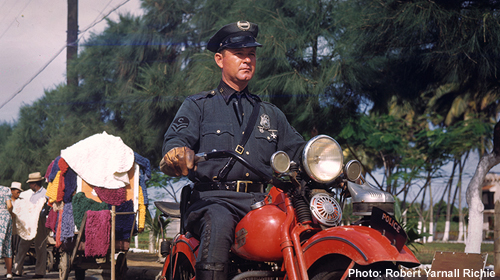
As a former police chief of numerous Oklahoma towns, including Seminole, Clinton, Blackwell, Owasso, Bethany, and Chickasha, I have seen officers disciplined for a variety of insubordinate acts. During my 35 years in law enforcement, however, I have never had to discipline an officer for refusing to carry out an assignment because he objects to the faith of the individuals he has been ordered to serve. Indeed, no officer serving under me has claimed that right because every law enforcement official knows that refusing orders on these grounds would not only amount to insubordination, but would also violate the oath sworn by all officers to uphold the U.S. Constitution. That oath requires that as, police officials, we serve and protect all members of the community, regardless of faith or belief.
That's why I am deeply troubled by a lawsuit filed by a Tulsa police officer, who claimed the extraordinary right to ignore an assignment that involved followers of the Muslim faith. As part of its community-policing initiative, the Tulsa Police Department decided to participate in a Law Enforcement Appreciation Day hosted by the Islamic Society of Tulsa. In my experience, community policing is an essential part of any comprehensive crime prevention plan. It allows police departments to build relationships, trust, and credibility with the community so that citizens cooperate and assist with criminal investigations and rely on the police to resolve disputes.
Like the 300-plus local events hosted by religious organizations and attended by Department officials in recent years, the Islamic Society Appreciation Day offered the Department a crucial opportunity to build bridges with a growing, but often-marginalized community population. Captain Fields and other shift supervisors were ordered to assign several officers to attend the event, or to attend themselves. Attending officers were not required to participate in any religious discussion, prayer, or worship service, and the Department assured Fields that officers would not have be present in the building at all when the day's planned worship service began.
Nevertheless, Captain Fields refused to carry out the orders, claiming that he could not attend – or even order subordinates to attend – because it would violate his belief that he must proselytize anyone who he knows does not share his Christian faith. After receiving a two-week suspension, Fields sued the city for violating his religious exercise rights.
From my perspective as a longtime law enforcement officer, the Department had no choice but to hold Captain Fields accountable for his insubordination. Allowing officers to refuse assignments because they deem them unimportant or because they conflict with their personal religious beliefs would set an unworkable precedent for law enforcement agencies across the state and nation and severely undermine their ability to effectively and efficiently protect the public.
What's more, allowing officers to reject orders to serve people of other faiths would give rise to religious strife and hostility within the community and would likely result in a two-tiered law enforcement system that treats religious minorities as second-class citizens. As the ACLU correctly points out in a friend-of-the-court brief filed last week with the U.S. Court of Appeals for the Tenth Circuit, under the precedent that Captain Fields seeks to set, he or other officers could refuse an assignment to guard a Sikh Temple that has been targeted for violence, ignore orders to provide a police presence at a war protest featuring Buddhist or other non-Christian speakers, decline to give a safety presentation at a Catholic school, avoid conducting foot patrols in neighborhoods with large Orthodox Jewish populations, or refuse to aid an injured woman in a hijab.
The right claimed by Captain Fields is fundamentally inconsistent with his sworn oath, which applies equally to reactive calls for assistance and more proactive duties, such as community policing—a critical part of any comprehensive crime prevention plan. It is, therefore, Captain Fields's professional responsibility to comply with all assignments issued by his superiors and his constitutional obligation to do so without regard to the faith of members of the public who will be served.
Edward L. Smith is the former president of the Oklahoma Association of Chiefs of Police. In his 35-plus years in law enforcement, he has served with the Oklahoma City Police Department and as the chief of police for a number of Oklahoma towns. In these positions, he led the first two law enforcement agencies in Oklahoma to be nationally accredited by the National Commission on Accreditation for Law Enforcement Agencies, Inc. Smith is a graduate of the Oklahoma City University and the FBI National Academy. He currently serves as the Director of Public Safety and campus chief of police at the University of Arkansas at Little Rock.
Learn more about religious discrimination and other civil liberty issues: Sign up for breaking news alerts, , and .


